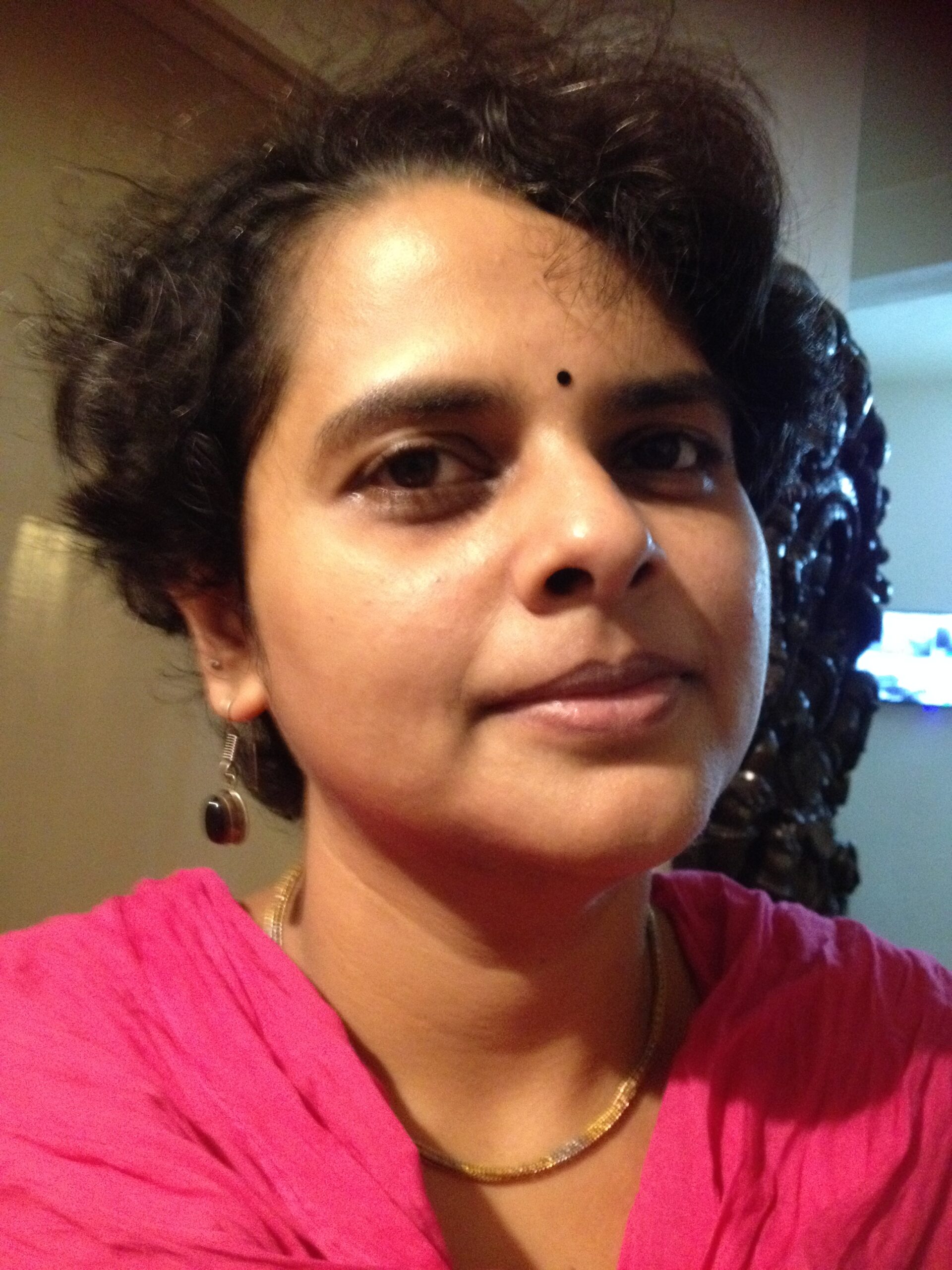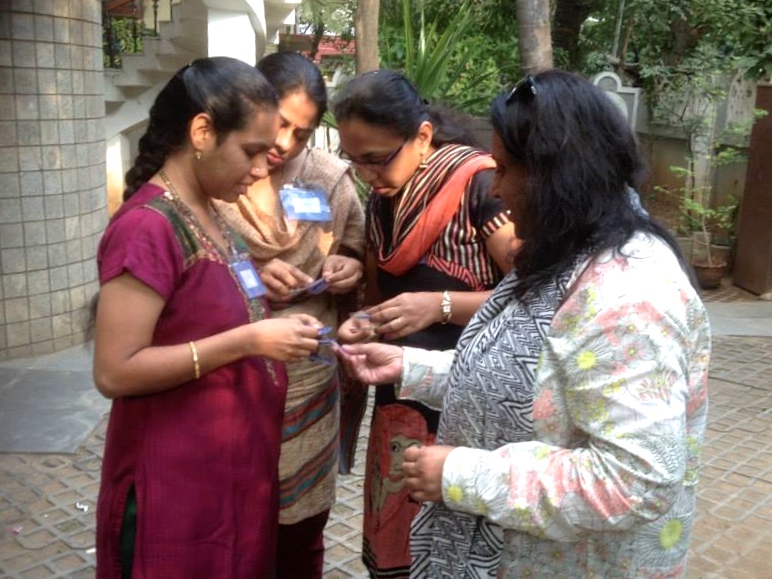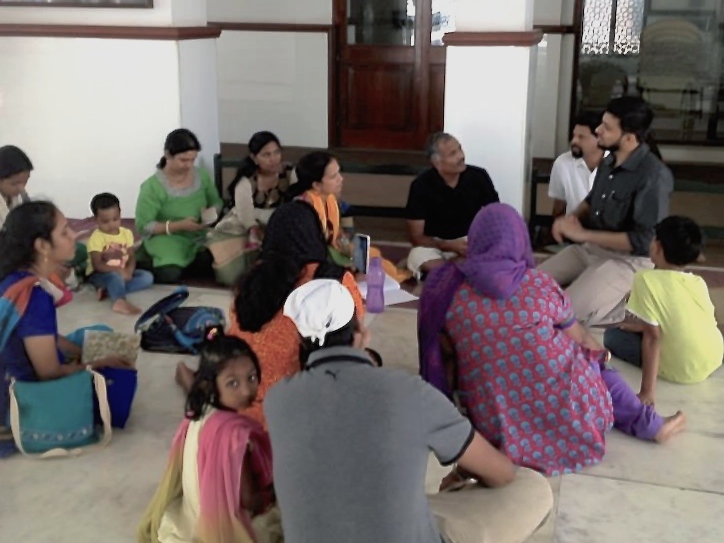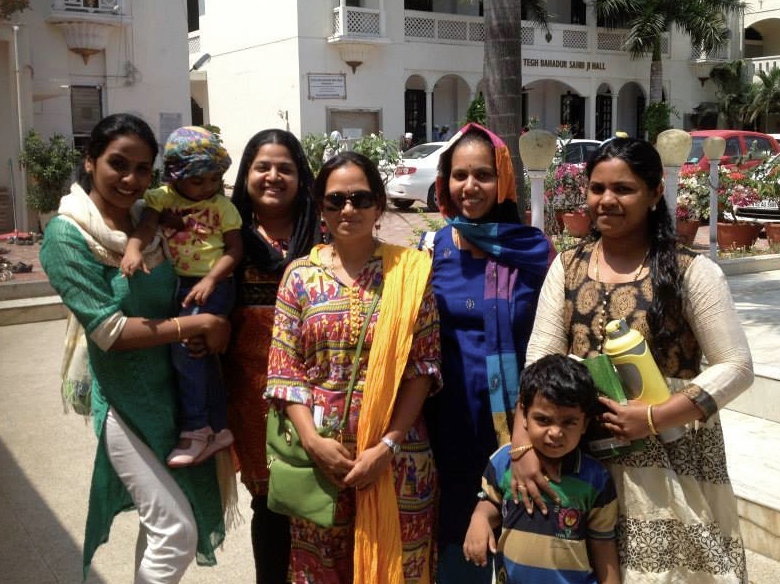
Mrs. Prabha Karthik coordinated during a period of ten months an ethics education program with families in Chennai, India. Prabha shares in this interview with us her journey using the Learning to Live Together Programme to support parents on strengthening their parenting skills.
The program used the educational framework, approach and methodologies of the Learning to Live Together manual. Activities were customized to parents with the purpose of creating spaces to discuss about values, spirituality, interfaith learning, the rights of the child and how to create safe environments for children.
This work is part of the Strengthening Family Systems programme of Arigatou International Geneva.
As parents, usually our goal is to bring our children up as successful individuals. So our focus usually narrows down to the child, his abilities, accomplishments and achievements. But when we open up the idea of ethical living as the basis for bringing up a child coupled with the values of respect, empathy and responsibility, it changes the scenario completely. It demands a higher level of functioning.
1. Tell us a bit about yourself (where are you from, where do you live, where are you working and how do you spend your free time)
My name is Prabha Karthik. I’m a mother of two – a 14 year old daughter, Janani, and a one a half year old son, Ishaan. I’m a Montessori teacher trained to work with elementary age children and I have also trained in Special Education. I live in Chennai, India with my husband Karthik and his parents and our two dogs. I have taken a break from Navadisha, the school I work with, since my son is so little. I plan to rejoin this academic year.
I hardly have any “free” time. But what I most enjoy doing is reading and watching movies. Recently I have begun to write about my experiences with my young son and how my Montessori training is helping me to see my child from a completely different perspective.
2. When and how were you trained as facilitator of the Learning to Live Together Program?
I am closely associated with Shanti Ashram in Coimbatore. The first Ethics Education workshop I facilitated there was in 2009 after being briefly trained by Maria Lucia and Suchith. My training has been more or less on the job although I have attended a Train the Trainer session in Coimbatore a couple of years ago. But there’s been no looking back since then and I have regularly facilitated about two to three workshops a year in Coimbatore, Chennai, Sri Lanka and Japan. In 2012 I conducted training for the teachers to bring ethics education to the children in our school.
3. What motivated you to start an ethics education program for families in Chennai?
I have been working as a Montessori teacher since 2009 and have met many parents in meetings and conducted many parent orientation programs and workshops. When this idea came about of taking the Learning to Live Together (LTLT) Programme to a younger age group – the most logical idea was to work with parents.
I loved the idea of doing this pilot project since although working within a certain structure – the number of sessions, the common core objectives, we also had a great deal of freedom and flexibility to design a program ourselves. We could tailor it to meet the needs of our target audience – a typical parent from an educated, urban middle class.
I had just taken a couple of years off from work and this seemed like the perfect project to work on.
4. Can you tell us about this program? What were the objectives, the target group and the duration?
Most of the parents who attended our talk were very keen on joining but were doubtful about whether they would be able to commit to the time frame that we had decided upon.At the time we decided to begin this project, we did not have a group of parents to work with. So we put together a small introductory session for about 40 minutes and addressed many small groups of parents. Overall we addressed about 70 parents/caregivers and finally 17 of them committed themselves to attend our workshop. Our sessions usually began with a short activity – most of the time we used the I Stand For exercise with provocative statements related to parenting issues. Every single talk saw parents vociferously engaged in the discussion bringing out many stereotypes and prejudices and our role was to moderate. We ended our talk with a description of Shanti Ashram, Arigatou International and its network, the Global Network of Religions for Children, GNRC. And the only thing that we asked of them was commitment to attend one session a month for 10 months.
Our target group was the urban, educated middle class. Most of the fathers were in high positions in companies or ran their own businesses. Most of our mothers were educated but were stay at home moms.
The objectives of our project were as follows.
By the end of the program, the parents will be able to:
- Examine their roles as individuals as well as parents
- Become aware of their own attitudes and stereotypes and how it influences the creation of a healthy and respectful environment in the family
- Reflect about their parenting practices, particularly on the importance of respecting their children, developing empathy and solving differences in a reconciliatory way
- Reflect on their responsibilities as parents
- Understand the broad principles of child development, be able to recognize those signs in their own children and assist them in the path of their development
- Develop skills that help them to engage with their children in a positive way, create dialogue, listen empathically, to enable critical thinking and foster ethical behavior
- Reflect on their own spirituality, understand the importance of addressing the spiritual needs of children in addition to their other needs and using their own religious sources of spirituality to create a safe environment for children, and support them to develop fully
- Become aware of their own emotional needs and states and how it affects their family and children.
Most of the objectives were fixed before the start of the programme. But we modified and added some based on our work with the group and our better understanding of their needs.
5. How do you believe the Pilot Project helped the parents who attended it? What new things did they learn?
I believe that we put together a comprehensive and thoughtful program and each person took what they needed from it. Many parents mentioned that the idea of the Learning Process and Participatory methodologies made them remember the trauma of their own childhood and education. Our community places a great deal of emphasis on education so much so that a child is judged solely on their performance of a student to the exclusion of all other areas of development. As part of one of our activities, we gave our parents a quiz based on the X grade syllabus and none of them were able to answer any of the questions. And the parents realized that they were confident, fully functioning adults even though they did not know the answers for those 10 questions.
We also helped them to become aware that it is not our job to prepare children for a future that we ourselves cannot envision. All we can do is to help develop their powers of critical thinking based solidly on the ideas of empathy and ethics. Some others were touched by the idea that children also needed time and space for exploring their own spirituality. Many were not aware that Child Rights existed and were intrigued by the right to participation and how that impacted every other right.
The sessions on emotional awareness and conflict resolution was very well received and two of our parents mentioned how they were so much more aware of the emotions that they were feeling and how they were able to stop and think before responding to a situation rather than reacting impulsively. And that this extended to not only their children but also their husbands and others in their family. They mentioned that they became aware of certain triggers that caused a negative reaction in them.
All of them appreciated the session on Understanding the Child where we went through the tendencies and characteristics of children as they grow and develop.

6. For you as a facilitator of the program, how did the project help you grow as a person? What was new about this project compared to the other ones you have worked on before?
The most significant difference between this project and the others I have worked on is that in this program, I got a chance to meet the same group of parents over an extended period of time.
Of the 17 who initially joined, 14 were active and engaged participants and successfully completed the programme.
This programme helped me to realize that all of us work from the best of intentions, all of us love the children that are our responsibility, but we are all so constrained by our own conditioning and upbringing that we do not think much about what we do in our day to day lives. We mostly think of our children as our property and that we need to bring them up to be a credit to us. I find it difficult to think of a two year old as an individual in his own right with the ability to think and make decisions.
This is what I think we helped our group to become aware of.
I was humbled and grateful for the sincerity and whole heartedness with which they engaged in our sessions.
I realized that it would have been wrong to do this workshop if we had been prescriptive. What I think the best part of our work is that we created a space for these parents to learn, think, discuss and thrash out their own ideas about parenting. And that I hope will stay with them for a much longer time. What has changed about these parents is the way to look at children and themselves.
For me personally, I have become less judgmental of others, more aware of my own responsibility as a parent as far as my emotional side is concerned. As for the professional side, I have confidence in my ability to put together a comprehensive program based on the needs of a group.
7. You worked with other facilitator on this program. How did you work together?
My friend Pavithra, who is also a Montessori teacher, and I worked together on this project. She too had attended an LTLT workshop just a few months before we began our SFS project. And she and I had worked to put together other LTLT programmes in our school.
We worked really well together in that we talked through each session thoroughly and planned down to the minutest details. We talked for days and slowly our sessions just grew and developed form and structure before our eyes! We had such confidence in our affection for each other that we had no ego problems when we disagreed with each other on any particular matter.
I was the main facilitator during the session itself, meaning I spoke most of the time and I put together all the power points, but there was no doubt about the fact that the whole programme was jointly put together by both of us.
8. You mentioned that the last day of the workshop was very emotional. Tell us more about it.
A few of our parents had been through stressful situations. One of the mothers who had a 10 year old daughter had just lost twin babies after giving birth to them prematurely. She said that she had been so focused on having more children for the sake of her daughter but had been treating her daughter very badly and neglecting her in the face of this crisis. She said that our programme helped bring meaning back into her life. And she said that she was grieving about what she had lost while alienating the daughter she had right in front of her.
Another mother had a child with autism and she said that she changed the way she saw herself and her life. She used to think that she was punished by being given a child with problems, but now she began to think about her son as an individual in his own right and not merely someone who belonged to her. She was the one who was most moved by Kahlil Gibran poem on Children.
Another parent said that when her son was a baby she was a very good mother, but her family used to correct and reprimand her so much about all that she did with her son that she lost confidence in herself. During the course of our 10 month programme, she enrolled in a fashion designing course and was a happier and more confident mother. She felt that her son and husband (her husband also came to six of our sessions before he had to leave the country on work) could sense it and they were a happier, more content and confidant family.
Another parent talked about how she was able to stop and think before reacting to situations. She articulated her emotions in one or two situations and she noticed that her 4 year old son began to do the same.
9. What do you think is the importance of ethics education for families and particularly when working with parents?

As parents, usually our goal is to bring our children up as successful individuals. So our focus usually narrows down to the child, his abilities, accomplishments and achievements. But when we open up the idea of ethical living as the basis for bringing up a child coupled with the values of respect, empathy and responsibility, it changes the scenario completely. It demands a higher level of functioning.
This ethics education programme is to ultimately benefit the child, but is primarily for the parents. We often have the best of intentions, but we unconsciously do the same things that our parents did to us while we were children. We are never aware of the emotional and cultural baggage we carry until we are faced with a situation that exposes it. And almost always, we take our anger and frustration out on our children because they are the only ones we seem to have complete power over.
When we begin to think and rethink our priorities, our principles, our stand on various issues, when as individuals we try and try again to be the best people we can be, we automatically become the best parents we can be.
We no longer have the luxury of thinking only of ourselves and our immediate families. Our world is in such a situation that it is of no great value if we bring up a child as a high achiever without a social conscience. We need a generation of children who care about our society enough to change themselves.
Dr. Montessori said that the child is the last great agent for social change. And it is only the love of a child that can make us change ourselves as human beings.
10. Do you have anything else to add about this experience?
This has been one of the most challenging, moving, transformative and fulfilling experiences in my life
